Papers by Antonella Samoggia
RePEc: Research Papers in Economics, Oct 1, 2010
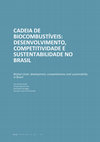
Informe GEPEC
The purpose of this paper is to analyze the Brazilian biofuel chain, according to the Porter’s co... more The purpose of this paper is to analyze the Brazilian biofuel chain, according to the Porter’s competitive advantage approach. The Brazilian biofuel policy is worldwide known not only by stimulating its production, but also by granting tax incentives. The current paper highlights how the biofuel policy was developed in Brazilsince the adoption of Proálcool, how this chain works, and how the government coordinates the different production stages. Despite Brazil had gone by different phases, from the full adoption and support by the federal government to the low public incentives, most of the mills kept the productive structure of Proálcool.The results of this study show that the government participation is crucial for the success of the biofuel program. In addition, unlike other nations,Brazilstill has the possibility to increase his production – either through harvest area or through productivity – without environmental damage. Thus,Brazilcould increase its exportation, with relativ...

Frontiers in Sustainable Food Systems
IntroductionCoffee is among the most appreciated beverages by consumers globally. Single serve co... more IntroductionCoffee is among the most appreciated beverages by consumers globally. Single serve coffee market expands and is highly profitable, but coffee in capsules (CIC) raises a major issue of environmental sustainability. The coffee industry aims to expand the CIC sales and to reduce capsule environmental impact and waste. To better define a sustainability-oriented strategy, the coffee industry needs to understand how to approach different socio-economic consumer groups. Thus, this study aims to explore consumers' perception and awareness of sustainable CIC, with specific attention on consumers' socio-economic characteristics.MethodsThe study interviewed a sample of 261 Italian consumers. Data elaboration includes four main steps: a cluster analysis leading to three socio-economic groups, a factor and structural equation modeling to confirm the factors and the relation between CIC sustainability and quality factors, and a multinomial logistic regression to examine the fa...
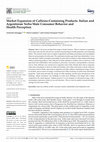
International Journal of Environmental Research and Public Health, 2021
Mate is the most consumed beverage in South America. There is interest in expanding yerba mate sa... more Mate is the most consumed beverage in South America. There is interest in expanding yerba mate sales into the old and new markets by promoting its health properties and energizing effects. The research study aims to explore Argentinian and Italian purchasing and consumption behavior and perception of yerba mate. The exploration includes agro-food chain stakeholders’ views, and consumers’ habits, perception, knowledge of yerba mate in relation to other market positioning caffeine-containing products. Data collection includes qualitative method, such as interviews with agro-food chain stakeholders, that is producers, processors, consumers, and quantitative consumer survey. Data collection was carried out in Argentina and in Italy. Results show that in Argentina yerba mate consumption is driven by habit and tradition, and in Italy yerba mate is mostly unknown. Consumers tend to drink yerba mate in Argentina and other caffeine-containing beverages in Italy to socialize, and as source of...
The food chain concept is an increasingly common theoretical instrument for food and rural develo... more The food chain concept is an increasingly common theoretical instrument for food and rural development policy and many countries adopt the so-called "new rural paradigm", so to integrate different sectoral policies. This paper aims at adopting the food chain paradigm in order to analyse the regional agro-food system and to sustain the design and delivery of consistent inter-sectoral policies. It adopts the netchain concept (Lazzarini et al, 2001) and the theory of governance patterns in global value chains (Gereffi et al, 2005). Results show this innovative approach contributes to better understand and stimulate economic performance of the whole agro-food network.
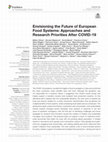
Frontiers in Sustainable Food Systems, 2021
The COVID-19 pandemic unveiled the fragility of food sovereignty in cities and confirmed the clos... more The COVID-19 pandemic unveiled the fragility of food sovereignty in cities and confirmed the close connection urban dwellers have with food. Although the pandemic was not responsible for a systemic failure, it suggested how citizens would accept and indeed support a transition toward more localized food production systems. As this attitudinal shift is aligned with the sustainability literature, this work aims to explore the tools and actions needed for a policy framework transformation that recognizes the multiple benefits of food systems, while considering local needs and circumstances. This perspective paper reviews the trends in production and consumption, and systematizes several impacts emerged across European food systems in response to the first wave of pandemic emergency, with the final aim of identifying challenges and future strategies for research and innovation toward the creation of resilient and sustainable city/region food systems. The proposal does not support a retu...
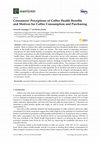
Nutrients, 2019
Coffee is popular worldwide and consumption is increasing, particularly in non-traditional market... more Coffee is popular worldwide and consumption is increasing, particularly in non-traditional markets. There is evidence that coffee consumption may have beneficial health effects. Consumers’ beliefs in the health benefits of coffee are unclear. The study aimed at analyzing consumers’ perceptions of coffee health benefits, consumption and purchasing motives of coffee consumers with positive perceptions of coffee health benefits, and willingness to pay for coffee with associated health claims. Data were collected through a face-to-face survey with consumers, resulting in a convenience sample of 250 questionnaires valid for data elaboration. Results were elaborated with factor analysis and logistic regression analysis. Findings revealed that a relevant minority of consumers believed that coffee could have positive health effects. The consumer with a positive perception of coffee health benefits is mostly male, young, works, is familiar with non-espresso-based coffee, consumes a limited a...
Wine Economics and Policy, 2018
agr.unipg.it
L'obiettivo del lavoro risiede nell'analisi dell'evoluzione dei processi decisiona... more L'obiettivo del lavoro risiede nell'analisi dell'evoluzione dei processi decisionali che coinvolgono i vari Enti Territoriali dell'Emilia-Romagna, rispetto alle politiche agro-ambientali, al fine di identificare quali siano i punti di forza o di debolezza che ...
The Role of Agriculture in …
The Role of Agriculture in Central and Eastern European Rural Development: Engine of Change or So... more The Role of Agriculture in Central and Eastern European Rural Development: Engine of Change or Social Buffer? MARTIN PETRICK, PETER WEINGARTEN (eds., 2004) Studies on the Agricultural and Food Sector in Central and Eastern Europe, Vol. 25, Halle (Saale), IAMO, pp. 37-52. ...
Sustainability, Feb 26, 2022
Sustainability, Aug 13, 2020

Frontiers in Sustainable Food Systems
Fairness and ethical values in agro-food chain lay at the center of the current debate on agro-fo... more Fairness and ethical values in agro-food chain lay at the center of the current debate on agro-food chain sustainability. The food labels may contain elements focused on agro-food chain management fairness practices. The objective of the present study is to explore what types of fairness agro-food companies value in the food products they commercialize, and if the characteristics of agro-food companies have a relationship with the type of fairness valued. The research study collected 226 commercialized food products containing information on the agro-food chain fairness practices companies adopted to produce the food products. Data elaboration included a cluster analysis to identify groups of fair products, and a multinomial logistic regression to explore the relationship between the identified clusters and fairness types, organic, nutritional and functional claims, and price. Results support that fairness-oriented products provide information on different types of fairness that is ...
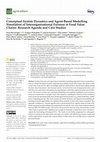
Agriculture
System dynamics and agent-based simulation modelling approaches have a potential as tools to eval... more System dynamics and agent-based simulation modelling approaches have a potential as tools to evaluate the impact of policy related decision making in food value chains. The context is that a food value chain involves flows of multiple products, financial flows and decision making among the food value chain players. Each decision may be viewed from the level of independent actors, each with their own motivations and agenda, but responding to externalities and to the behaviours of other actors. The focus is to show how simulation modelling can be applied to problems such as fairness and power asymmetries in European food value chains by evaluating the outcome of interventions in terms of relevant operational indicators of interorganisational fairness (e.g., profit distribution, market power, bargaining power). The main concepts of system dynamics and agent-based modelling are introduced and the applicability of a hybrid of these methods to food value chains is justified. This approach...
Zenodo (CERN European Organization for Nuclear Research), Oct 15, 2021
Understanding food value chains and network dynamics Start date of project: 01/06/2017 Duration: ... more Understanding food value chains and network dynamics Start date of project: 01/06/2017 Duration: 52 Months Project co-funded by European Commission within the H2020 Programme Dissemination level of this deliverable PU Public X CO Confidential, only for members of the consortium (including the Commission Services) RE Restricted to a group specified by the consortium (including the Commission Services) CI Classified, information as referred to in Commission Decision 2001/844/EC. Deliverable D8.4 Scenario analysis report with policy recommendations An assessment of sustainability, resilience, efficiency and fairness and effective chain relationships in VALUMICS case studies:
Zenodo (CERN European Organization for Nuclear Research), Oct 30, 2020
Agriculture, May 18, 2022
Zenodo (CERN European Organization for Nuclear Research), Oct 30, 2020
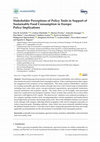
Sustainability
Transitioning agri-food systems towards increased sustainability and resilience requires that att... more Transitioning agri-food systems towards increased sustainability and resilience requires that attention be paid to sustainable food consumption policies. Policy-making processes often require the engagement and acceptance of key stakeholders. This study analyses stakeholders’ solutions for creating sustainable agri-food systems, through interviews with a broad range of stakeholders including food value chain actors, non-governmental organizations, governmental institutions, research institutions and academic experts. The study draws on 38 in-depth, semi-structured interviews conducted in four European countries: France, Iceland, Italy and the UK, as well as three interviews with high-level EU experts. The interviewees’ solutions were analysed according to a five-category typology of policy tools, encompassing direct activity regulations, and market-based, knowledge-based, governance and strategic policy tools. Most of the identified solutions were located in the strategic tools cate...
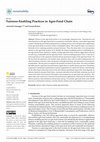
Sustainability
Fairness in the agro-food system is an increasingly important issue. Ensuring fair and ethical pr... more Fairness in the agro-food system is an increasingly important issue. Ensuring fair and ethical practices in the agro-food chain is essential for sustainable, effective, and resilient agro-food systems. Identifying and understanding fairness-enabling practices and existing business applications in the agro-food chain is crucial to create a sustainable system. This research study is an extensive literature review analyzing academic and grey literature. Thus, this study aims: (i) to conceptualize fairness in the agro-food system; (ii) to identify the fairness-enabling practices contributing to a fair agro-food system; and (iii) to explore existing agro-food chain business applications relevant to achieving a sustainable and fair agro-food chain. Fairness-enabling practices have a vital role in achieving fairness in the upstream and downstream operational stages of the agro-food chain. On the one hand, the upstream cycle includes many elements, from a ban on unfair trading practices to ...

Uploads
Papers by Antonella Samoggia